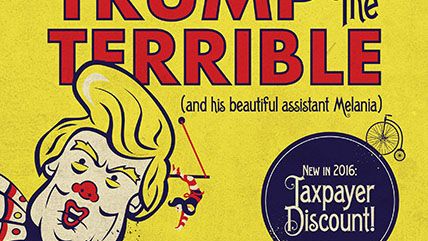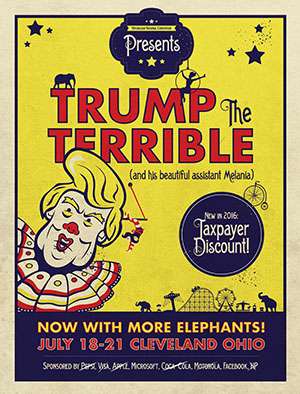Who Paid for the Conventions?
Following the money to the Democrats' and Republicans' quadrennial dog-and-pony shows


Here's one bright spot in a bleak election year: This summer's Democratic and Republican conventions were not subsidized by taxpayers.
In 2012, the public contributions to those distinguished demonstrations of democracy—the shows where you could see Clint Eastwood hectoring an empty chair or a weepy video tribute to Ted Kennedy—ran upwards of $18.2 million each (not including the cost of security), according to a May 2016 report from the Congressional Research Service. But this year, for the first time since 1972, the parties and their host cities' host committees were on the hook to raise all the money to stage their own four-day infomercials. Under the Gabriella Miller Kids First Research Act, passed in 2014, funds that once went to subsidize political conventions have been diverted to pediatric health care research.
Supporters of convention subsidies argued—in the words of that Congressional Research Service report—that "conventions had a history of questionable fundraising and that eliminating public funding raised the prospects for real or apparent corruption." Yet corporations have been openly sponsoring the conventions for years, even as public funds were also available. In that context, relying slightly more heavily on private financing seems a trivial concern.
A more substantial concern, at least for the Republicans, was certain corporations' skittishness about having their brands associated with any event where Donald J. Trump was expected to receive a presidential nomination.
Just days before the RNC began, Politico reported that Republican National Convention (RNC) organizers were so under target they were compelled to write a letter to Sheldon Adelson, begging the casino magnate to close the $6-million gap left by the "more than two dozen prominent corporations and individuals who have reneged on a collective $8.1 million in pledged donations," including Pepsi, Visa, and others. The Atlanta-based soda giant Coca-Cola donated $660,000 to the RNC in 2012, according to The New York Times, and plans to honor the agreement it made last year to supply both conventions with $70,000 in cash and beverages, but has reportedly canceled a $1 million donation for this year's convention.
In June, Apple declined to sponsor this year's GOP convention, with officials privately telling Republicans that Trump's incendiary sexist, racist, and xenophobic comments precluded their participation. According to The Wall Street Journal, Motorola and Hewlett-Packard decided it would be best not to support either convention this year, though each spent over $500,000 on the conventions in 2012.
Other companies appear to have no such compunctions. Facebook provided "financial and other support" to both events. (Before the conventions, a Facebook spokesman told reason the company would support the two conventions "in a similar manner and without endorsing any one candidate, issue, or political party," for the reason that "encouraging this ongoing conversation is important because an informed debate about the candidates and the issues is essential to the democratic process.") Microsoft granted both parties "a variety of Microsoft technology products and services" (but no cash, unlike in previous years). Google was the "official livestreaming provider" of both conventions and had a heavy branding presence.
Emily Lauer—senior director of public relations and communications at Destination Cleveland, as well as the Cleveland host committee's media liaison—says companies get three things out of sponsoring the events. The first applies primarily to enterprises based in Northeast Ohio, such as the Cleveland Clinic, KeyBank, and Ernst and Young LLP: pride in the fact that the city has "the opportunity to be on the international stage." The second is "to support the political process of the United States"—demonstrated, Lauer says, by the fact that many companies try to avoid the appearance of partisanship by giving to both conventions. And the third is "access" to the convention and surrounding events.
Craig Holman of the watchdog group Public Citizen argues that a different sort of access is in play: Business sponsorships, he told NPR in May, provide an "excellent opportunity for lawmakers and candidates to embrace the very wealthy special interests and the corporate interests."
In any event, taxpayers were still on the hook for the conventions' security costs. Both Cleveland, which hosted the Republican dog-and-pony show, and Philadelphia, which hosted its Democratic counterpart, received $50 million through the Department of Justice, which has been funding convention security since 9/11. The Secret Service and local law enforcement were also on hand to keep the peace, undoubtedly billing for countless hours of overtime and the temporary hiring of thousands of out-of-town officers in the process.
This article originally appeared in print under the headline "Who Paid for the Conventions?."


Show Comments (29)